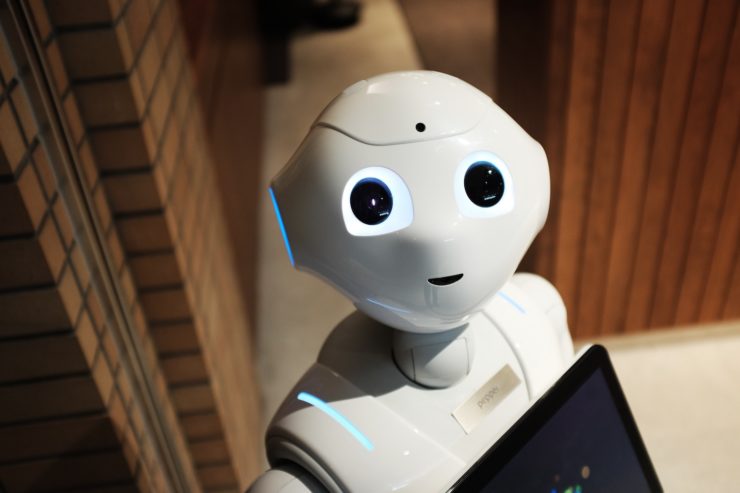Who doesn’t love a good robot? From classic science fiction films of the 1950s to the synthetic life in Star Trek: Picard, the latest reboot in the Star Trek franchise (which is really, really good, by the way), writers and fans alike have been fascinated by sentient machines for decades.
Me, too.
The original idea for this post was “Five Times Where AI Doesn’t Take Over the World.” But it didn’t seem fair to compile a list of stories in which the humans always win, because if it comes down to it, they won’t. Bwuuuuuuhahahahahaha. (For those of you who might now suggest I’m an artificial life form, I merely say, prove it. I’ll pass your little Turing Test at least 90 out of 100 times. I think.)
Anyway, here’s the list. Enjoy!
Runaway Robot by Lester Del Rey
Runaway Robot is the first book I remember choosing to read on my own. It was fourth grade and the book was sitting on the shelf of the P.S. 28 school library in Yonkers, NY. This is the story that got me hooked on science fiction, and, outside of the robot in the original Lost in Space television series, was my first encounter with an artificial intelligence.
The book is told from the point of view of Rex, a robot buddy to human teenager Paul. The powers that be are trying to separate Paul and Rex, so the two go on the run. The robot’s name might suggest he’s as much a faithful dog as an AI companion, but Rex has a good sense of humor, searing intelligence, and true familial love for Paul. Runaway Robot is old school science fiction for sure (Paul’s family lives on a moon of Jupiter where they grew food for the people of Earth), but it’s a great opportunity for younger readers to tap into the world of science fiction for the first time.
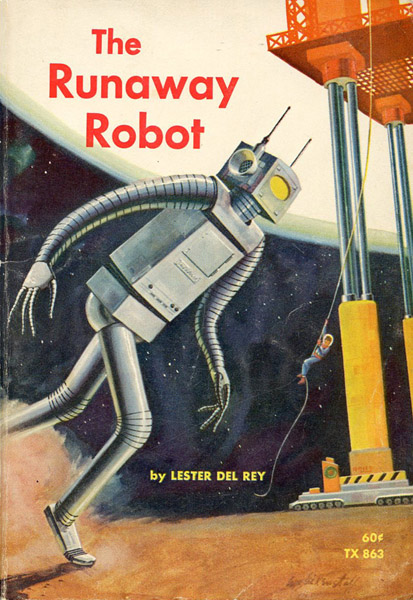
The Moon Is a Harsh Mistress by Robert Heinlein
The Moon Is a Harsh Mistress, like many of Robert Heinlein’s books, will be seen as both dated and controversial. But this story of political intrigue on a late 21st Century lunar penal colony is so compelling that the book stands on its own merits. At the heart of the story is the HOLMES IV supercomputer, which, as the book opens, has become self-aware. The computer befriends one of his service technicians, Manuel Garcia “Mannie” O’Kelly Davis, who names the computer Mike, after Mycroft Holmes, Sherlock’s brother.
Mike is one of science fiction’s all-time great AI characters. From his early attempts to understand humor, to becoming the leader of a lunar revolution (with echoes of the American Revolution), Mike does it all; he is instantly lovable and completely memorable.
The Moon Is a Harsh Mistress won the Hugo Award, was nominated for a Nebula Award, and is widely regarded as one of the great science fiction novels of all time. It deserves all of those accolades.
Buy the Book
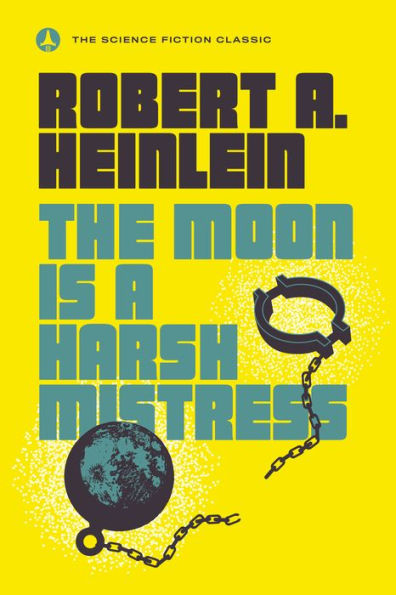

The Moon Is a Harsh Mistress
Illuminae by Amy Kaufman and Jay Kristoff
Illuminae is the third novel on my list in which the AI doesn’t actually take over the world. But it wants to. Sort of.
What happens when an AI loses its mind? What is mental illness to a machine? AIDAN, the AI frenemy of protagonist Kady Grant, is unbalanced. But unbalanced for a brilliant supercomputer is a whole different kettle of fish. Through most of the book, you never really know if AIDAN is a good guy or a bad guy, but you will not be able to get enough of him, nor will you be able to forget him.
I should also note that Illuminae is an epistolary novel, with the sequence of documents, layout, and design all serving as a kind of extra character. Along with its two sequels, Illuminae is unlike anything I’ve read before or since. I LOVE this entire series.
Buy the Book
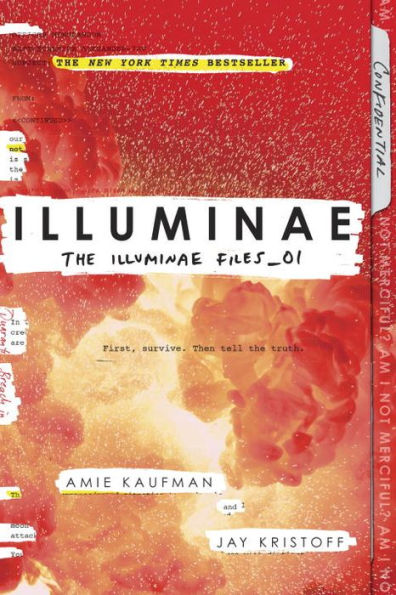

Illuminae
The Cyberiad by Stanislaw Lem
I don’t know if AI have taken over the world in The Cyberiad, Stanislaw Lem’s brilliant collection of short stories, but we pretty much only ever see robots, so I guess they have. The robots are essentially anthropomorphized machines living in a kind of galactic medieval society. Each story is a mini allegory, and each one is laugh out loud funny. The main characters, two “constructors,” Trurl and Klapaucius, are nearly omnipotent robots who can build anything. They are best friends, they are rivals, and they are too clever for their own good.
Another classic of science fiction (re-reading this post and seeing that three of the books were originally published in the 1960s, I’m starting to realize I’m old), The Cyberiad is perfect for fans of The Hitchhiker’s Guide to the Galaxy (my all-time favorite book and series). Special shout out to Michael Kandel for his translation from the original Polish. There is so much fascinating word play in these stories, it’s a testament to both the author and the translator for making it work so seamlessly.
Buy the Book
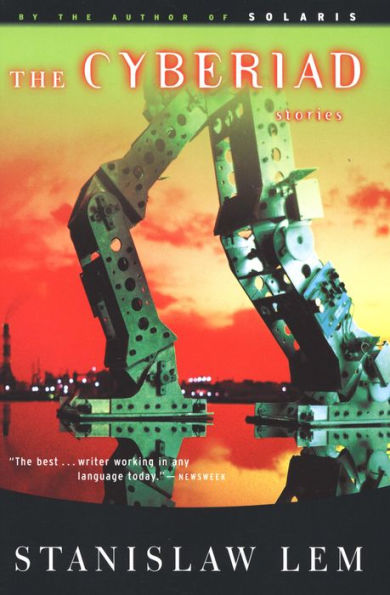

The Cyberiad
Sea of Rust by C. Robert Cargill
Sea of Rust is definitely a book where AI take over the world. In fact, the last human crawls out of the sewers and dies on page two. Boom.
Decades later, the robots in Sea of Rust, led by a scavenger name Brittle, are battling a massive, hive-mind artificial intelligence to protect their individual freedom. The bots grapple with moral dilemmas, painful memories of the brutality they unleashed on humans, and what it means to be a living, thinking person. (A person, not a human.) These philosophical musings are encased in an adventure story that reads like a bad-ass android Western.
This is one of the books—along with Moon Is a Harsh Mistress and Otherworld (by Jason Segel and Kirsten Miller)—that directly influenced the writing of Hard Wired, my own take on AI. Thanks C. Robert!
Buy the Book
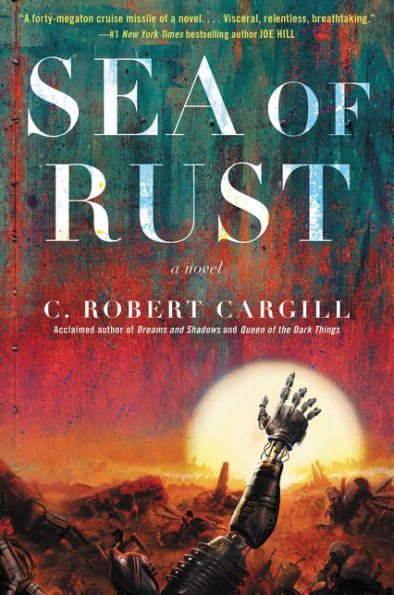

Sea of Rust
Len Vlahos dropped out of NYU film school in the mid ‘80s to play guitar and write songs for Woofing Cookies, a punk-pop four piece that toured up and down the East Coast, and had two singles and one full-length LP on Midnight Records. After the band broke up, he followed his other passion, books. He is the author of Life in a Fishbowl, as well as The Scar Boys, a William C. Morris Award finalist and a #1 Indie Next pick, and Scar Girl, the book’s sequel. Len lives in Denver with his wife and two young sons, where he owns the Tattered Cover Book Store. Find him on Twitter @LenVlahos and Instagram @len.vlahos










